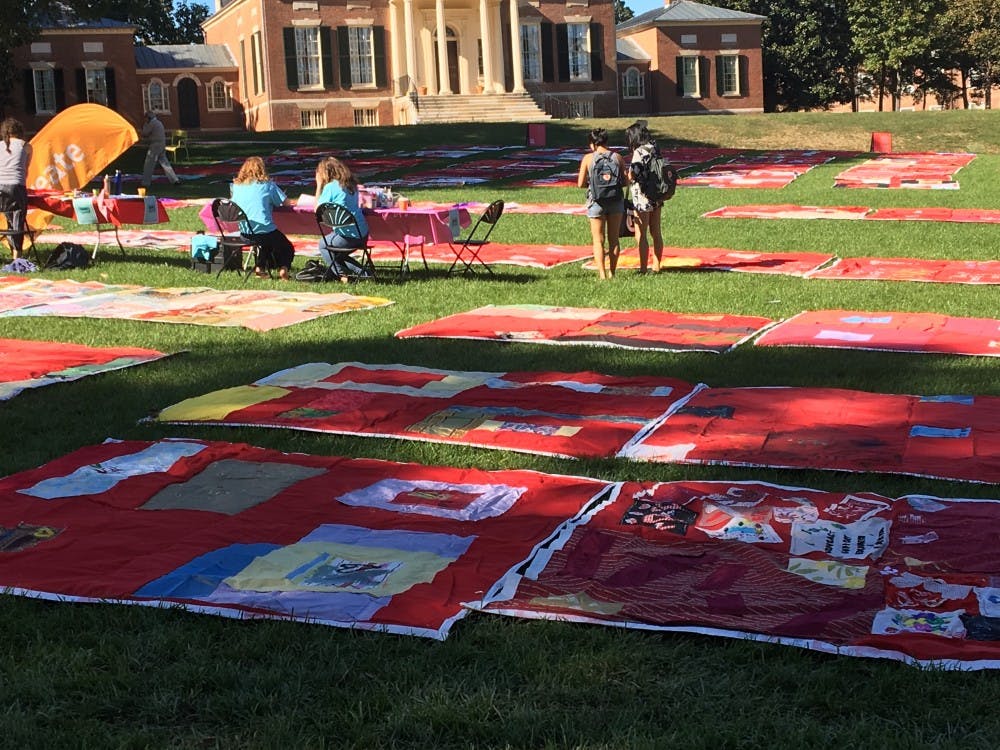FORCE, a Baltimore-based activist group, brought the Monument Quilt to Hopkins on Wednesday as a public display of support for survivors of sexual assault. The Monument Quilt is a collection of 2500 squares of fabric with stories, reflections and words of advice. A selection of these squares were arranged across the Beach to spell out “You are not alone.”
Throughout the day, students were able to view the quilt and contribute tiles. Cards were also available to educate people about how they could support survivors.
The Sexual Assault Resource Unit (SARU), the Center for Health Education and Wellness, the Office of LGBTQ Life, Women and Gender Resources and Bystander Intervention Training co-sponsored the event.
The Monument Quilt was last displayed at Hopkins in 2015. Over the last two years, policy makers and University administrators have continued to debate how to address sexual assault on college campuses.
On Oct. 2, SARU released an open letter to University President Ronald J. Daniels, asking him to uphold Obama-era guidelines on investigating sexual assault. On Sept. 22, Secretary of Education Betsy DeVos rescinded the 2011 “Dear Colleague” guidelines as well as a 2014 document titled “Questions and Answers on Title IX Sexual Violence.”
At press time, 504 people had signed the letter.
Junior Vahni-Vishala Bernard, a member of SARU, believes the quilt is a form of activism and can give sexual assault survivors a stronger voice.
“The main point of the Monument Quilt is to empower survivors by giving them a voice and celebrating their journey to healing by creating a community and safe space to combat sexual violence,” she said.
Bernard also pointed out problems she saw with how sexual assault cases are handled.
“It’s not taken as seriously as it should be, because anytime someone does speak out against an incident... either nothing happens or the process is so delayed that it is ineffective,” she said.
Saida Agostini, the chief operating officer of FORCE, explained how artists Rebecca Nagle and Hannah Brancato came up with FORCE and the Monument Quilt.
They felt that public monuments could help survivors recover from trauma.
“We’ve been all over the country. We’ve been in 44 cities, and we definitely love working with campuses, where there’s a lot of conversation about sexual and domestic violence,” Agostini said. “The Monument Quilt is a place where people can come and have conversations about how rape culture is promoting other types of violence.”
She described FORCE as an artist’s collective that is trying to combat rape culture through art. The group holds workshops in various cities, where some of the quilts were made. Others were submitted online or by survivors of violence who came to see the quilt.
Agostini joined FORCE because she wanted to fight the stigma against survivors of sexual assault.
“For me, especially as a survivor, it’s really important... to have a space that’s about believing,” she said. ”So often when you try to talk about your experiences, you are met with doubt and disbelief. Why did that happen? Are you sure that happened?”
According to the Rape, Abuse & Incest National Network, one out of six women are survivors of an attempted or completed rape. In addition, minorities are more likely to experience assault than white women.
“There’s a stereotype about survivors being white, straight, cis,” she said. “To have people who are queer, transgender, undocumented and other types of immigrants is really important to us.”
Senior Wen Wen Teh stopped to look at the Monument Quilt for the first time while walking across campus.
“I’ve actually not been here before in these four years,” she said. “I was going to class and I thought I should go. I think it’s great to give people a platform without being judged.”
Teh admired that the Monument Quilt represents a culture of awareness around sexual assault survivors in the U.S. She thinks that fostering open discussions and increasing students’ awareness of these issues is a positive step.
“I’m not from America, so this issue is really swept under the rug. In Malaysia, we don’t have sexual education or even talk about sexual violence. It shows that people care and they actually do something about it,” she said.
Sophomore Sydney Timmerman appreciated the space the Monument Quilt provided to address sexual assualt.
“These aren’t stories that are told openly in public,” she said. “It’s cool that it’s open on the Beach. It gives people a place to talk about it and be acknowledged.”





